#socially necessary labour
Text
Marx's value
Roman Rozdolsky – The Making of Marx’s ‘Capital’.
[RR-TMMC, 533-35]
Ο Μαρξ ρωτά πώς μπορούμε να προσδιορίσουμε την εργασία ως ουσία της αξίας εάν, στην πραγματικότητα, κάθε συγκεκριμένη εργασία εξυπηρετεί διαφορετικό στόχο καιεκτελείται από διαφορετικά άτομα διαφορετικών ικανοτήτων, δεξιοτήτων κ.λπ.; Πωςμπορεί η άπειρη ποικιλία των διαφορετικών ειδών επαγγελματικών καιατομικών εργασιών να…
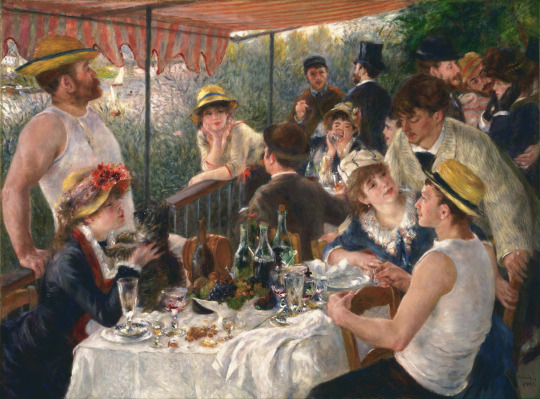
View On WordPress
#abstract labour#average#average undifferentiated labour#concrete labour#exchange#Karl Marx#labour#labour as the substance of value#physiological#Roman Rosdolsky#RR-TMMC#simple expenditure of labour-power#socially necessary labour#value
0 notes
Note
I'm sorry Neil, although I love your writing and agree with your opinions on most subjects I have to disagree with you on the writers' strike. No-one should have a more privileged life as a result of being clever and creative. I worked from the age of 15 to the age of 65 in low-paid jobs, taking 1 year off to go to drama school and 3 years off to get a fine art degree. I worked in terrible but necessary jobs, labouring, stacking boxes, unloading trucks, running errands, filing, going to work on a bicycle at all hours of the day and night on shift work in all kinds of weather. Even when I was a student I was still working in part-time cleani8ng jobs and even during periods of unemployment I worked in volunteer jobs for charities and social services.
According to Mensa I have an IQ of 160 and according to Plymouth University I have a BA hons in Fine Art but I cannot accept the idea that writers and other creative people should avoid normal jobs like driving an "Uber" or working in an office/shop/factory/construction site. To accept that idea would be to create a new aristocratic class when we should abolishing the old princes and aristocrats.
What we need, I feel sure, is a redistribution of labour so that everybody who can do so would spend some time each year in blue collar work and everybody who can would get higher education and a chance to make art of one sort or another.
The idea of doing other jobs to supplement writing or drawing shouldn't be seen as a terrible thing, a punishment or a suffering. Sharing the jobs around should be seen as normal.
I mean, I've done my half century of sweat labour and it didn't hurt me too much. I'm retired now and still making art of various kinds and I've never asked anyone to pay me for any art piece I've made. making art, writing, drawing etc. is the fun stuff which we get to do in exchange for the blue collar stuff which puts food on the table.
The worst pop song ever written was Sting/Dire Straits song "Money for Nothing" which ridicules the working class from a position of educational privilege.
So what's my question? My question is: What's wrong with a writer doing other jobs to make ends meet? Sounds perfectly fine to me.
Nothing's wrong with a writer doing other jobs to make ends meet. Writers and artists have been doing that since the dawn of time. Actors too.
But by the same token, there's nothing right about assuming that writing isn't a blue-collar job, or that writers and other people who make art can only make it for love and that thus they need other jobs to subsidise their craft.
I like living in a world in which the people who make the things that make the world worth living in get paid for their work. For me, that includes the people who make films and TV, books, art and music and comics.
Having spent a lot of time on film and TV sets, it's a blue-collar world on set, and everyone is working long and hard to make the shows you love. I'm never going to suggest that the riggers or the gaffers or the make-up team or the focus-pullers should drive ubers in order to have the privilege of being on the set and working there.
Or to put it another way, from the most blue-collar writer I ever knew...
youtube
11K notes
·
View notes
Text
Degrowth scholarship notes that capitalist growth depends on the creation of artificial scarcity. Human needs can typically be satisfied either by means of relatively resource-efficient, non-commodified need satisfiers (for instance, public transit; food from a community kitchen), or by means of relatively scarce and resource-inefficient commodities (a privately owned car; a meal from a home-delivery service). Under capitalism, essential goods (housing, healthcare, transit, nutritious food, etc.) are commodified and access is mediated by prices that are often very high. To obtain the necessary income people are compelled to enter the capitalist labour market, working to produce things that may not be needed simply to access things that clearly are needed. Artificial scarcity of essential goods thus ensures a steady flow of labour for capitalist growth. It also creates growth dependencies: if productivity improvements (or recessions) lead to unemployment, people suffer loss of access to essential goods and growth is needed to create new jobs and resolve the social crisis. This dynamic explains why, despite capitalism's high levels of production and resource use, many basic needs remain unmet even in high-income countries. In this respect, capitalism is deeply inefficient and wasteful.
How to pay for saving the world: Modern Monetary Theory for a degrowth transition
880 notes
·
View notes
Note
"it was made by a person" does not absolve the image of sin, because by that logic every piece of ai art is ok actually. because obviously the ai could never just make art, the people using it to generate book covers so they don't have to pay an artist are actually typing in the description for what they want the ai to make. so it's ok !! a human told the ai to make that ❤❤❤❤
I mean. Other than the moralizing ("absolve of sin", "so it's ok!" etc)...Yes? Of course AI art is made by people?
Do you think AIs have agency or something? Do they find their own data and train themselves without a human telling it to? How does the AI pay for electricity?
If AIs have agency why can't they be Artists?
You're undermining your own position and actually fundamentally agreeing w the silicon valley tech bros lmao
If someone pays a human on Fiverr $5 to make a book cover in order to avoid paying someone a more reasonable price....thats basically the same moral situation right. If that guy on Fiverr is just choosing between 10 different templates he already has (and maybe copied from the internet!) and just changing the text on it, he is "typing what they want to make". What's the difference to paying someone $5 on Fiverr to generate a book cover for you using AI. Where's the moral difference, what does the tool have to do with anything.
AI doesn't have any agency, people do. AI is a tool. AI being used to lower prices is an economic choice made by humans.
A useful analytical framework to understand why this is the natural result of competition is actually Historical Materialism, which understands the social world as fundamentally existing of Humans, Human action, and Human relationships. Instead of trying to act like things like AI - spectral reflections of human labor - are "creatures" themselves, and tilting at windmills. Historical Materialism teaches not only why this happens, but how to overcome that process entirely.
In machinery, objectified labour materially confronts living labour as a
ruling power and as an active subsumption of the latter under itself, not only by appropriating it,
but in the real production process itself; [...]In machinery, objectified labour itself appears not only in the form of product
or of the product employed as means of labour, but in the form of the force of production itself. The
development of the means of labour into machinery is not an accidental moment of capital, but is rather
the historical reshaping of the traditional, inherited means of labour into a form adequate to capital. The
accumulation of knowledge and of skill, of the general productive forces of the social brain, is thus
absorbed into capital, as opposed to labour, and hence appears as an attribute of capital, and more
specifically of fixed capital, in so far as it enters into the production process as a means of production proper.[...]
In machinery, knowledge appears as alien,
external to [the worker]; and living labour [as] subsumed under self-activating objectified labour. The worker
appears as superfluous to the extent that his action is not determined by [capital's] requirements.[...]
Fixed capital, in its character as means of production, whose most adequate form [is] machinery,
produces value, i.e. increases the value of the product, in only two respects: (1) in so far as it has value;
***i.e. is itself the product of labour, a certain quantity of labour in objectified form***; (2) in so far as it
increases the relation of surplus labour to necessary labour, by enabling labour, through an increase of
its productive power, to create a greater mass of the products required for the maintenance of living labour capacity in a shorter time. It is therefore a highly absurd bourgeois assertion that the worker
shares with the capitalist, because the latter, with fixed capital (which is, as far as that goes, itself a
product of labour, and of alien labour merely appropriated by capital) makes labour easier for him
(rather, he robs it of all independence and attractive character, by means of the machine), or makes his
labour shorter. Capital employs machinery, rather, only to the extent that it enables the worker to work
a larger part of his time for capital, to relate to a larger part of his time as time which does not belong to
him, to work longer for another. Through this process, the amount of labour necessary for the
production of a given object is indeed reduced to a minimum, but only in order to realize a maximum
of labour in the maximum number of such objects. The first aspect is important, because capital here --
quite unintentionally -- reduces human labour, expenditure of energy, to a minimum. This will redound
to the benefit of emancipated labour, and is the condition of its emancipation.
Nature builds no machines, no locomotives, railways, electric telegraphs, self-acting mules etc. These
are products of human industry; natural material transformed into organs of the human will over nature,
or of human participation in nature. They are organs of the human brain, created by the human hand;
the power of knowledge, objectified. The development of fixed capital indicates to what degree general
social knowledge has become a direct force of production, and to what degree, hence, the conditions of
the process of social life itself have come under the control of the general intellect and been
transformed in accordance with it. To what degree the powers of social production have been produced,
not only in the form of knowledge, but also as immediate organs of social practice, of the real life
process.
Marx [PDF link]
273 notes
·
View notes
Photo

Child Labour in the British Industrial Revolution
Children were widely used as labour in factories, mines, and agriculture during the British Industrial Revolution (1760-1840). Very often working the same 12-hour shifts that adults did, children as young as five years old were paid a pittance to climb under dangerous weaving machines, move coal through narrow mine shafts, and work in agricultural gangs.
It was very often the case that children's jobs were well-defined and specific to them, in other words, child labour was not merely an extra help for the adult workforce. The education of many children was replaced by a working day, a choice often made by parents to supplement a meagre family income. It was not until the 1820s that governments began to pass laws that restricted working hours and business owners were compelled to provide safer working conditions for everyone, men, women, and children. Even then a lack of inspectors meant many abuses still went on, a situation noted and publicised by charities, philanthropists, and authors with a social conscience like Charles Dickens (1812-1870).
A Lack of Education
As sending a child to school involved paying a fee – even the cheapest asked for a penny a day – most parents did not bother. Villages often had a small school, where each pupil's parents paid the teacher, but attendance was sometimes erratic and more often than not the education rudimentary in hopelessly overcrowded classes. There were some free schools run by charities, and churches often offered Sunday school. Not until 1844 were there more free schools available, such as the Ragged schools established by Anthony Ashley-Cooper, 7th Earl of Shaftesbury (1801-1885). These schools concentrated on the basics, what became known as the 3 Rs of Reading, Writing, and Arithmetic. Compulsory education for 5 to 12-year-olds, and the institutions necessary to provide it, would not come along until the 1870s. Consequently, "at least half of nominally school-age children worked full-time during the industrial revolution" (Horn, 57).
Some factory owners were more generous than others to the children in their employ. An example is the Quarry Bank Mill in Styal in the county of Cheshire. Here the owner provided schooling after the long working day was over for 100 of its child workers in a dedicated building, the Apprentice House.
An indicator of better education, despite all the difficulties, is literacy rates, rather imperfectly measured by historians by recording the ability of a person to sign one's name on official documents such as marriage certificates. There was a great improvement in literacy, but by 1800, still only half of the adult population could sign their name to such documents.
For those children who could find work in the Industrial Revolution, and there were employers queueing up to offer it, there were no trade unions to protect them. For the vast majority of children, working life started at an early age – on average at 8 years old – but as nobody really cared about age, this could vary wildly. Working involved at best tedium and at worst an endless round of threats, fines, corporal punishment, and instant dismissal at any protest to such treatment. In one survey taken in 1833, it was found that the tactics used with child labourers were 95% negative. Instant dismissal accounted for 58%. In only 4% of cases was a reward given for good work, and a mere 1% of the strategies used involved a promotion or pay rise.
Continue reading...
100 notes
·
View notes
Note
Hi Im a begginer marxist. I've read a few of his books and agree with his points, but there's something I don't quite understand yet as he hasn't addressed it all that much in the ones I've read so far which is: why do communists support wage equality? Although I definitely agree that every worker deserves the full product of ther labor, don't different jobs produce diferent amounts of value in the same period of time? And with supply and demand, wouldn't more necessary jobs still be paid more?
so the answer to this one is kinda just 'they don't, really'. communists are generally (in principle) opposed to the wage-form entirely. the marxist definition of a wage is 'the price of the commodity called labour-power'. that is:
Their commodity, labour-power, the workers exchange for the commodity of the capitalist, for money, and, moreover, this exchange takes place at a certain ratio. [...] The exchange value of a commodity estimated in money is called its price. Wages therefore are only a special name for the price of labour-power.
— Karl Marx, Wage Labour & Capital
alright, let's back up a bit. what does any of that mean? well, labour-power is a marxist concept that distinguishes 'labour' (that is, work, which is qualitative--work is done for a particular purpose, you labour to achieve something) vs. labour-power (that is, potential labour which is sold and therefore quantified--enumerated in hours or in finished products, the purpose of which is to receive compensation). unlike labour, labour-power is a commodity--which is to say, as well as a use value (it fulfils some kind of need or desire) it has an exchange value (it is exchanged for other commodities).
so 'wages' are the price of labour-power. what exists here to 'oppose', exactly? well, it's the very act of buying and selling labour-power, because labour-power is worth more than its price! that is, unlike every other sort of commodity, it is productive--when you purchase labour-power, that labour-power generates for you more value than you paid for it (e.g., when a starbucks barista is paid $10 an hour for a five-hour shift, they produce far more than $50 in profit by making and selling coffee). this is the fundamental economic engine of capitalist exploitation
however, the answer to this exploitation is not so much that 'workers deserve the full product of their labour', as you put it. one of the fundamental injustices of capitalism is that for the eight hours (or more!) of the day that one spends labouring, you have no control over your life or your work. you are selling this time of your life to somebody else--they have quite literally bought these hours from you. you are not spending them doing what you are doing, but spending them making money so that you can survive--you're alienated from the actual actions you take and product you produce, which become fungible and irrelevant.
in a communist (i.e. classless society), this sale of labour would no longer take place. you would not work to make money (that is, at a price, which is to say, for a wage)--your life would be your own and you would work to accomplish that which you are working towards. builders would not build houses so that they could get paid, but so that there would be houses for people to live in.
"alright, but that's pretty far-off, right?" yep! the abolition of the wage is not by any means a short-term or immediate goal. so do revolutionary socialist states in a transitional economy support total wage equality? nope. and it's not because of any bourgeois guff about some jobs being 'more important' than others--it's certainly not because of 'supply and demand', which is not a natural law but simply a law of the functioning of a labour market.
to understand why not every job would be compensated equally under socialism, let's take a look at how prices emerge. sure, every commodity's price is influenced by supply and demand. the more people are competing to buy it, the more necessary it is that each buyer outbids the others and so the higher the price. likewise, the more people are competing to sell it, the more necessary it is that each seller finds a means of of undercutting the other and so the lower the price.
but hold on--higher in relation to what? lower in relation to what? if supply & demand led to a potato costing $600, you'd probably say 'that's a fucking ridiculously high price for a potato'--but why? 'high' and 'low' are relative terms--supply and demand can drive prices 'up' or 'down' but they must be driven 'from' something. and that's simple--the basic price of a commodity is the cost of producing it. you expect a potato to be significantly less than $600 because it costs significantly less than that to grow one (1) potato.
what does that mean for wages (remember, they're just the price of labour-power)? the cost of producing labour-power (the potential to work) is, to be blunt, the cost of keeping the worker in question alive, able to have and raise children, and in a condition to work. now that last point is quite important--because there are some jobs that can be done by anybody with a warm body, and there are others that can only be done with years and years of training. you can get anyone off the street and get them to wait tables, even if they'll obviously not be as good as somebody who's done the job for a long time. you can't do the same with nuclear physicists or plumbers.
so--even in absence of the capitalist labour market (the competition betwen employers to buy labour and the competition between workers to sell it) the cost of producing labour-power is going to vary across jobs. it costs more to produce an hour of a doctor's labour than it does a waiter's, not because the doctor is more worthy or important a profession, but because that hour of labour is prefigured by years of medical school.
tldr: under communism, there will be no wages. under socialism, wages will vary according to their cost of production (and not according to prestige, or supply and demand) so long as some sort of exchange-economy is still maintained.
250 notes
·
View notes
Text
On Authority
A number of Socialists have latterly launched a regular crusade against what they call the principle of authority. It suffices to tell them that this or that act is authoritarian for it to be condemned. This summary mode of procedure is being abused to such an extent that it has become necessary to look into the matter somewhat more closely.
Authority, in the sense in which the word is used here, means: the imposition of the will of another upon ours; on the other hand, authority presupposes subordination. Now, since these two words sound bad, and the relationship which they represent is disagreeable to the subordinated party, the question is to ascertain whether there is any way of dispensing with it, whether — given the conditions of present-day society — we could not create another social system, in which this authority would be given no scope any longer, and would consequently have to disappear.
On examining the economic, industrial and agricultural conditions which form the basis of present-day bourgeois society, we find that they tend more and more to replace isolated action by combined action of individuals. Modern industry, with its big factories and mills, where hundreds of workers supervise complicated machines driven by steam, has superseded the small workshops of the separate producers; the carriages and wagons of the highways have become substituted by railway trains, just as the small schooners and sailing feluccas have been by steam-boats. Even agriculture falls increasingly under the dominion of the machine and of steam, which slowly but relentlessly put in the place of the small proprietors big capitalists, who with the aid of hired workers cultivate vast stretches of land.
Everywhere combined action, the complication of processes dependent upon each other, displaces independent action by individuals. But whoever mentions combined action speaks of organisation; now, is it possible to have organisation without authority?
Supposing a social revolution dethroned the capitalists, who now exercise their authority over the production and circulation of wealth. Supposing, to adopt entirely the point of view of the anti-authoritarians, that the land and the instruments of labour had become the collective property of the workers who use them. Will authority have disappeared, or will it only have changed its form? Let us see.
Let us take by way of example a cotton spinning mill. The cotton must pass through at least six successive operations before it is reduced to the state of thread, and these operations take place for the most part in different rooms. Furthermore, keeping the machines going requires an engineer to look after the steam engine, mechanics to make the current repairs, and many other labourers whose business it is to transfer the products from one room to another, and so forth. All these workers, men, women and children, are obliged to begin and finish their work at the hours fixed by the authority of the steam, which cares nothing for individual autonomy. The workers must, therefore, first come to an understanding on the hours of work; and these hours, once they are fixed, must be observed by all, without any exception. Thereafter particular questions arise in each room and at every moment concerning the mode of production, distribution of material, etc., which must be settled by decision of a delegate placed at the head of each branch of labour or, if possible, by a majority vote, the will of the single individual will always have to subordinate itself, which means that questions are settled in an authoritarian way. The automatic machinery of the big factory is much more despotic than the small capitalists who employ workers ever have been. At least with regard to the hours of work one may write upon the portals of these factories: Lasciate ogni autonomia, voi che entrate! [Leave, ye that enter in, all autonomy behind!]
If man, by dint of his knowledge and inventive genius, has subdued the forces of nature, the latter avenge themselves upon him by subjecting him, in so far as he employs them, to a veritable despotism independent of all social organisation. Wanting to abolish authority in large-scale industry is tantamount to wanting to abolish industry itself, to destroy the power loom in order to return to the spinning wheel.
Let us take another example — the railway. Here too the co-operation of an infinite number of individuals is absolutely necessary, and this co-operation must be practised during precisely fixed hours so that no accidents may happen. Here, too, the first condition of the job is a dominant will that settles all subordinate questions, whether this will is represented by a single delegate or a committee charged with the execution of the resolutions of the majority of persona interested. In either case there is a very pronounced authority. Moreover, what would happen to the first train dispatched if the authority of the railway employees over the Hon. passengers were abolished?
But the necessity of authority, and of imperious authority at that, will nowhere be found more evident than on board a ship on the high seas. There, in time of danger, the lives of all depend on the instantaneous and absolute obedience of all to the will of one.
When I submitted arguments like these to the most rabid anti-authoritarians, the only answer they were able to give me was the following: Yes, that's true, but there it is not the case of authority which we confer on our delegates, but of a commission entrusted! These gentlemen think that when they have changed the names of things they have changed the things themselves. This is how these profound thinkers mock at the whole world.
We have thus seen that, on the one hand, a certain authority, no matter how delegated, and, on the other hand, a certain subordination, are things which, independently of all social organisation, are imposed upon us together with the material conditions under which we produce and make products circulate.
We have seen, besides, that the material conditions of production and circulation inevitably develop with large-scale industry and large-scale agriculture, and increasingly tend to enlarge the scope of this authority. Hence it is absurd to speak of the principle of authority as being absolutely evil, and of the principle of autonomy as being absolutely good. Authority and autonomy are relative things whose spheres vary with the various phases of the development of society. If the autonomists confined themselves to saying that the social organisation of the future would restrict authority solely to the limits within which the conditions of production render it inevitable, we could understand each other; but they are blind to all facts that make the thing necessary and they passionately fight the world.
Why do the anti-authoritarians not confine themselves to crying out against political authority, the state? All Socialists are agreed that the political state, and with it political authority, will disappear as a result of the coming social revolution, that is, that public functions will lose their political character and will be transformed into the simple administrative functions of watching over the true interests of society. But the anti-authoritarians demand that the political state be abolished at one stroke, even before the social conditions that gave birth to it have been destroyed. They demand that the first act of the social revolution shall be the abolition of authority. Have these gentlemen ever seen a revolution? A revolution is certainly the most authoritarian thing there is; it is the act whereby one part of the population imposes its will upon the other part by means of rifles, bayonets and cannon — authoritarian means, if such there be at all; and if the victorious party does not want to have fought in vain, it must maintain this rule by means of the terror which its arms inspire in the reactionists. Would the Paris Commune have lasted a single day if it had not made use of this authority of the armed people against the bourgeois? Should we not, on the contrary, reproach it for not having used it freely enough?
Therefore, either one of two things: either the anti-authoritarians don't know what they're talking about, in which case they are creating nothing but confusion; or they do know, and in that case they are betraying the movement of the proletariat. In either case they serve the reaction.
- Engels, 1872
179 notes
·
View notes
Text

𝐏𝐢𝐜𝐤 𝐀 𝐂𝐚𝐫𝐝: 𝐖𝐡𝐚𝐭 𝐘𝐨𝐮 𝐍𝐞𝐞𝐝 𝐓𝐨 𝐇𝐞𝐚𝐫 !


From left to right, top to bottom: Pile 1, Pile 2, Pile 3, Pile 4, Pile 5, & Pile 6!
Instructions: Use your intuition to pick a card that calls to you most, then scroll to the bottom underneath the read more and find your pile(s) to receive your message!
Disclaimer: take what resonates, leave the rest of what doesn't & don't force anything if it doesn't fit your situation, keep in mind that energy and outcomes can always change & nothing is forever set in stone, you have free will in every choice you make !! keep in mind that this is a general collective reading so the messages here may not apply to everyone. as a general message: my readings are for entertainment purposes only and don't replace professional medical/legal/business help. feedback and a review after a reading is given, whether public or private, is obligatory. you can do that by reblogging ( only if the reading was made for you specifically ), dming or emailing us privately on the matter. if you do not provide this, you will be added to my greylist and won't be given anymore readings, free or paid, until you give feedback. keep in mind it's more than okay to pick more than one pile if you feel you have messages in other piles! don't just leave this in the likes, reblog and support your tarot readers, my time and labour aren't for free. while it isn't necessary, if you'd like to tip, here's my p/ayp/al. I have personal paid readings available which you can fill out the form here so tips, bookings & feedback are highly appreciated considering i plan to do this for a living!
decks used: Disney Villains Tarot & Dark Wood Tarot & Pink Tarot & Killstar ( or as we lovingly call it Memento Mori ) Tarot & Horror Tarot & GANGSTA. Tarot.



Pile 1: You have Justice! First things first is the most obvious in terms of synchronicities: the movie Big Hero 6 may have some significance to you, or East Asian culture, particularly Japanese culture. You may either live in Japan or have traveled to or plan to travel to Japan. You may be born in San Francisco, California, or California as a whole may also be significant to you or you may be American. When I look at this card, my first intuitive thought is that you may be worried about the state of the world right now, and honestly, I wouldn't even blame you, so am I, but I need you to know that things are not hopeless. If you raise your voice and spread awareness to things that matter to you like the way things are going right now and you genuinely care about other people, then you're doing the right thing. You yourself could be an activist or at the very least if you're not officially one, you could care greatly about social justice. The number 11 could be significant to you. Justice is ruled by Libra so you may have those placements or someone you know or someone important to you could have those placements. On a less grander scale, I can see something being made right for you in a situation that's been going on in your life, I'm specifically seeing for a lot of you this could be a relationship - I'm mostly getting romantic relationships here but it could be a friendship dynamic - gone wrong or someone who refused to hire you for whatever reason. You'll likely either reconcile with someone or alternatively for some of you, you could be getting a better offer. Regardless, though, if this resonates with you, congrats, Pile 1, I'm so happy for you!!


Pile 2: You have The High Priestess! You may be intuitively drawn to the occult or your faith, should you have one, right now, and you may be isolating to look at the situations in your life introspectively. The color green may be significant to you. A feminine energy may be significant (it doesn't necessarily have to be a woman!), whether it's a mother, a sister, a girlfriend, an elderly woman, an ancestor of yours or maybe even a feminine deity who wants to reach out to you. You yourself may be interested into getting into tarot and I say if that applies to you, go for it! The number 2 may be significant, it may be a date of the month that's significant, something could happen in 2 days or 2 weeks or 2 months, or, alternatively, since February is the second month of the year, something important could be happening this February! Cancer, Scorpio & Pisces may be significant, you may have those in your placements or someone you know may have those placements considering its ruled by the Moon.


Pile 3: You have Strength! This is completely random but I'm getting that at least some of you who get this card and picked this pile are furries, otherkin, alterhuman and/or someone who has animal deities that they follow. Some of you may literally be lionkind if you're otherkin or you may have a lion as a fursona if you're a furry or if you are a system, you may have a system member who's a lion. You may also be neurodivergent, I'm getting for a lot of y'all autistic specifically, considering the infinity symbol. The color pink may be significant to you because this is my pink tarot deck. I'm getting that if you practice and believe in crystal healing, get some rose quartz, especially if you want to attract love, especially romantic love, into your life. Lions may pose some significance to you, and if not lions, then felines. You yourself may have a cat. You may be spending more time with your cats. The Lion King may be significant. For very few of you you may actually work with wild animals, especially big cats, which if that's the case that's literally so cool! This was what I read for someone last month when I told y'all that you'd have to be resilient in something you're doing because someone may be testing your patience and I'm getting that again. Make sure to set healthy boundaries with someone if necessary! Leo may be significant, whether you have those in your natal chart or someone you know has those placements. The number 8 could be significant, something could happen in 8 days which is little over a week from when you're reading this. This is random, too, but I'm getting an intuitive hit to buy flowers for yourself if you're alone by yourself on Valentine's Day if you're reading this by the time this post is written. Someone may want to give you flowers, or flowers in general may be significant to you. Regardless, though, I know for a fact that you'll be slaying anyway no matter what you do! SLAY!


Pile 4: You have The World! I'm immediately getting that you're about to or already have completed a cycle in your life and to that I say congratulations, Pile 4!! I'm getting a ringing in my right ear so that just confirms it!! Maybe you've FINALLY managed to achieve something you've wanted to do, maybe you're feeling a little more at ease in this new chapter in your life. For some of you I'm getting that you may have moved to a new place! If that applies, that's awesome, Pile 4!! The number 21 could be significant, you yourself could be 21 or something could happen on the 21st of a month. The Earth element rules The World may be significant, so Taurus, Virgo and Capricorn may be significant to you, and since Saturn rules The World, Capricorn and Aquarius may also be significant to you, whether you have any of those placements yourself, or someone else you know may have them. The symbol of Ouroboros may be significant to you, too. Regardless, though, I say y'all are doing wonderfully and I'm hoping y'all will stay on the top of the world !!

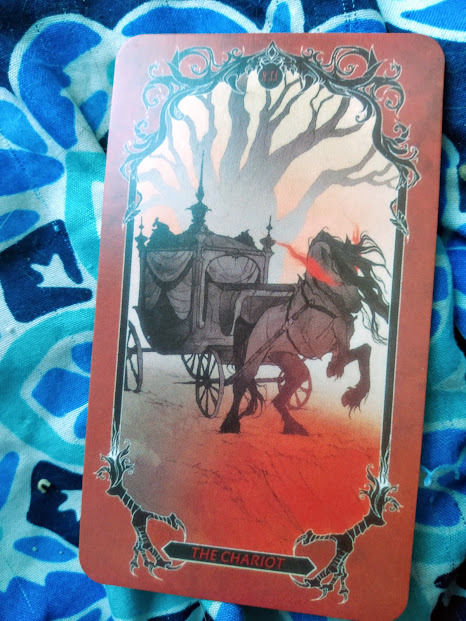
Pile 5: You have The Chariot! You may be struggling to move forward with a decision you've made or maybe even debating on what to choose. Usually in the traditional Rider Waite tarot there's two horses representing two choices, that isn't present here as there's only one horse here. To that I say follow your heart and your intuition most of all and it won't lead you astray. I'm getting this... very specific message for a lot of you, but I need y'all to know this, okay? It's okay to leave the past behind. It's okay to let go. Horses may be of significance to you. For very few of you I'm getting you may be equestrians or have ancestors who were equestrians, notably Mongolians and Scythians or any of the Plains Turtle Island Indigenous Nations, but that definitely won't apply to everyone. For some of you the Celtic deity Epona or perhaps even The Legend of Zelda may be significant because I'm getting The Legend Of Zelda: Wind Waker's opening theme playing in my head ehehe. The Chariot is ruled by Cancer so Cancer may be significant to you, and the number 7 may be significant, something could be happening a week from now when you're reading this which is what I'm getting for a lot of you and for others your birthday could be the 7th of a month, alternatively, you could be born in July. You've got this!


Pile 6: You have The Empress! HOOO BOY I'm getting for a lot of you who picked this pile, y'all may be lesbians and/or sapphics of some kind because I just got, like, psychically blasted in the face with some really gay shit and specifically sapphic yearning LMAO. I don't know, I'm just getting that vibe and not just from the character Gina Paulklee from GANGSTA. herself who she herself is canonically a lesbian/sapphic. For a few of you, the animanga series GANGSTA. may be significant to you, or you may want to read/watch it as you may find some messages in there that may be important to you. For some of y'all, a strong maternal figure could be significant like a mother, an aunt or even a deity who's really powerful who may be trying to reach out... I'm getting Athena (Hellenismos) and Sekhmet (Kemeticism) for a lot of y'all, and for fewer of you, I'm getting Amaterasu (Shinto), Hera (Hellenismos), Hathor (Kemeticism), the Morrigan (Celtic Paganism), Freyja (Asatru), Oshun (Yoruba Ifa, Candomble & Santeria, Black/Afro-Latine exclusive, if you're nonblack don't touch!), and Sky Woman (Huron-Iroquois/Haudenosaunee, if you're nonnative or not a member of any of these nations don't touch!) so any of these deities may be significant to you. If it doesn't apply, let it fly. You could be in your divine feminine energy (everyone has this energy inside them regardless of gender, sex, orientation or presentation!) and stepping into your own personal power. Some of y'all may be exploring sensuality and your own sexuality or for any of my lesbians/sapphics in this pile, you may be getting a girlfriend. This my baddie pile and I don't necessarily mean in an Instagram baddie way (and you don't have to be a woman to be a baddie!) although you could fit or like that aesthetic, but I moreso mean in the sense that you're gaining confidence in yourself and what you do, and in other words, you really are That Bitch TM & I'm so happy for y'all if that applies !! The Earth element rules The Empress so that may be significant, so Taurus, Virgo and Capricorn may be significant to you, and Venus rules The Empress and for some of y'all I'm getting that Aphrodite (Hellenismos) and/or Venus (Religio Romana) literally may be wanting to reach out to you to work with you if you don't already. The number 3 may also be significant, so something could be happening in March as its the third month of the year and as I'm posting this the month after this month, alternatively, the 3rd of a month may be significant, or something could be happening in 3 days from now, or weeks or months, but I'm getting for y'all it's likely 3 days. With that said, that's about all I have for your reading, thank you so much for being here!

#arcana.tarot#arcana.uploads#tarotblr#tarot reader#tarot community#tarot reading#free tarot#free tarot reading#witch of color#pac#pick a card#tarot#witchblr#tarotcommunity#tarotcreator#tarotonline#divination#channeled message#channeled reading#indigenous witch
67 notes
·
View notes
Text
a lot of places just want you to have A Degree which the claim is that it proves you have the ability to pick something + stick to it + stay on top of assignments and manage your time etc (tags left on this post about academia as a class barrier, via @seveneyesoup)
this is putting me in mind of the idea of the "accomplished" gentlewoman in 18th & 19th-century England: how a woman, to be worthy of installment in a heterosexual marriage as the mistress of a home, manager of servants, refuge for her husband (depending on the source of his money) from the harsh world of capital, & instiller of virtue in children, must herself demonstrate virtue and aptitude for certain tasks by collecting a train of accomplishments well before the time when she is no longer of marriagable age (say, mid-to-late twenties).
sometimes there is a direct link posited between the accomplishments she is meant to be obtaining and her ability to make a man a good wife (playing at the pianoforte means she may amuse him); sometimes the link is a bit less direct (maybe he'll like being surrounded by prettily designed tables and painted screens? given the Victorian moralisation of aesthetics & domestic decoration that could make sense); sometimes the reasoning is a bit circular (she may teach her daughters feminine accomplishments and thus enable them to make good wives); sometimes it's hypothesised that the point of all of this is to demonstrate genteel idleness ("look how much time I have to do things that are neither earning money nor immediately necessary to the running of the household").
but, though certain accomplishments were considered necessary for decades together (European languages, pianoforte playing or perhaps the harp, dancing), others (designing tables, netting purses, painting screens) went in and out of fashion, or even through what you might call fads. I remember reading one man in particular complain about how ugly Berlin wirework (a type of needlepoint / embroidery done on a wire frame) was, and how he hoped women would soon tire of it.
so sometimes the point of gaining an accomplishment when it may be considered very dated by the time you have daughters of an age to be taught anything is considered to be demonstrating an aptitude for things-doing, in general. shewing that you are patient, dedicated, quiet, good at managing time and exacting self-discipline, content to stay at home, capable of applying sustained concentration and physical effort to a task (that does not produce money and that, if it is 'fancy' work, may not produce anything necessary at all)...
these are the qualities, supposedly, that enable a woman to do the administrative & planning tasks required to run a household, emotionally support and/or submit to her husband, &c. 'moral' discipline is also necessary to the maintenance of the family as the unit of social reproduction along the lines of inheritance (that is, you want to marry a virginal woman to ensure that your children are 'yours').
& of course this is all economic—making oneself erotically desirable to a man of the appropriate class is the only way to preserve or advance one's rank / class status if one is not independently wealthy (or possessing of a sibling or something willing to support you).
this sort of pre-conditioning reminds me of the amount of social / military &c. disciplining that is required for a proper 'workforce' to be created (proletarianisation); a population must be broken of habits including a tendency to rest—to do things at unpredictable or inconvenient (for the owning class) times—to consult an almanac rather than a clock in deciding whether and when to go to work—or to fuck off for a while with no notice to go do seasonal work—if they are to be a viable source of factory labour.
so the idea of pre-disciplining—of a certain attitude towards time, labour, the self, and society being inculcated in people in order to suit them for a specific type of labour—as well as the idea of 'self-discipline' being a sort of muscle that disciplining the self can train, and whose strength can then be put to performing other tasks than the ones that first exercised it—is a common thread that runs through these different situations.
I think a full analysis of this would also have to explore the tension between the above 'self-discipline' and the mythicisation of the idleness of the Victorian bourgeois housewife (even as many of them really did perform many tasks around the home), as well as the tension between the supposed Very Extra Importance and Busy-ness and the actual lack of a time-discipline of the sorts of sinecures that having the right university degrees + knowing the right people can get you.
#this also leaves out a lot of other kinds of labour including forced labour#but I'm not trying to be exhaustive here#long post /#women's labour#Victorian
110 notes
·
View notes
Note
chaosheadspace's addition....fucking supreme. I am going feral. Furthermore, my brain has once again been taken over by this au.
For some reason I am convinced Alex just "has to go" (cough cough) on some important business trip with Paul towards the end of Dream's pregnancies. The first time everyone could write it off as unlucky timing buy the third time it happens everyone knows it's deliberate.
Alex and Dream might behave at social events but to everyone who works at the manor it is obvious the two don't exactly like spending more time together than strictly necessary for keeping up appearances.
Everyone can agree it's a dick move for Alex to not be there for the birth of "his" children (the staff are 99% sure that Dream/Hob and Alex/Paul is what is happening here) but both Dream and Alex ignore it. The idea of Alex having to care for Dream close to & during labor makes both of them break out in hives, no thank you. Hob can take care of that.
Maybe Alex promotes Hob to Dream's personal assistant or something to keep up appearances. He is being such a good husband by making sure Dream has someone there for him when he himself is unfortunately indisposed (Lucienne is Dream's p.a. in a business sense here).
While Alex is off to France or something (where he is definitely not having an insane amount of sex with Paul while they wait for news of the baby's arrival), Hob and Dream get to be together.
Dream might not have had someone there to comfort him through the morning sickness but at least he gets to have someone there to dote on him and massage his aching back for those final weeks when Hob's pup is big and heavy.
When Dream goes into labor, Hob is there to take care of him and the kids, juggling holding Dream's hand and playing with the kids and reading them stories before bed. Afterwards, when Dream is tired and sore, Hob will be there to take care of him and the newborn, as well as to keep the older children occupied so their dad and little sibling can rest.
[ for someone who loves angst I sure am a sucker for the comfort part of it ]
- 🍃
Ahshdhfjgm yes perfect! Another lovely anon had a similar idea of Hob becoming the go-to guy when Dream is labour because the Burgesses aren't there/dont care, and I think its wonderful!
It's fantastic news for Hob because he gets quality time with Dream in those precious final weeks before the new arrival, and he actually gets to be one of the first to hold the baby! It almost makes up for all the time they have to spend apart. He absolutely dotes on Dream, and soaks up all the time he can get snuggled up with the older children plus the newest little one. Side by side or in his lap it's impossible not to notice that they're his kids, every single one of them. And honestly he'd love them just the same if they weren't his, because they came from Dream. The most beautiful, precious person he's ever met. How could Hob fail to love him and his babies?
72 notes
·
View notes
Text
The Horde and Toxic Strength
The Etherian Horde, at least superficially, expects all it's members to be "Strong". So let's dig into what that means.
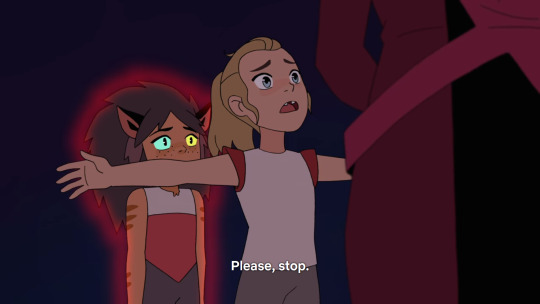
Being Strong means being a provider, a protector. It means being The Only One who can do something, holding a monopoly on some necessary resource or task.
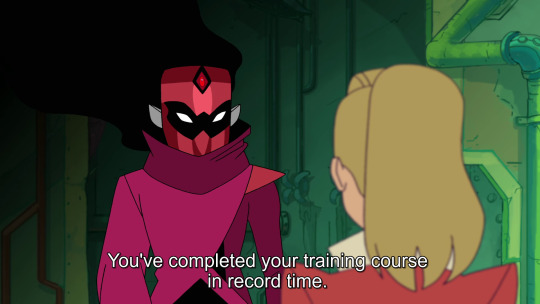
Being Strong means being skilled, getting promoted, winning at life. It is treating every action and interaction as a competition, with a requirement to always hold the scoreboard's top slot.
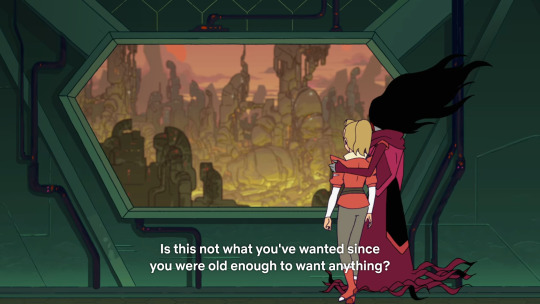
Being Strong means being stoic. It means not being ruled by your emotions; being rational and making the correct choices, sublimating your own desires into the concept of The Greater Good and the demands of society.
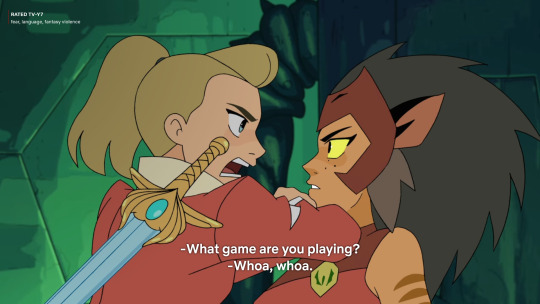
And, implicit to all the of the above, Strength means violence, because violence is the tool of the Strong; you protect by attacking external threats, you win by bringing overwhelming force to bear, you remain stoic by channelling the feelings you supposedly don't have into the outlet of punching things.
And that's why everyone isn't strong.
Necessary Weakness

If Being Strong is about protecting and providing, then there needs to be someone in need of protection. Someone who can't defend themselves, who is dependant upon the Strong to provide that service.

If being Strong is about winning, then someone needs to lose; there need to be names filling out the bottom of the scoreboard - more than that, there need to be names that don't even make it onto the list. Jobbers who's only role is to fail.
The Etherian Horde's concept of Strength is built on a bedrock of conflict and threat. The Weak need to exist so that the Strong have something to define themselves against. But Strength demands so much more from 'The Weak' than simple failure.
A Warped Social Contract
Strength as defined above implicitly requires a power imbalance - the Strong have power the Weak lack - but it's not about simple dominance, with the Strong forcing the Weak to cater to them.

The Strong do have obligations; they owe stoicism and service to society. It is their duty to work, to produce, to march off to war. They must protect and provide, they have to win - and if they do so, their Weak dependants will be pulled along in their wake, able to share in the fruits of their labour.
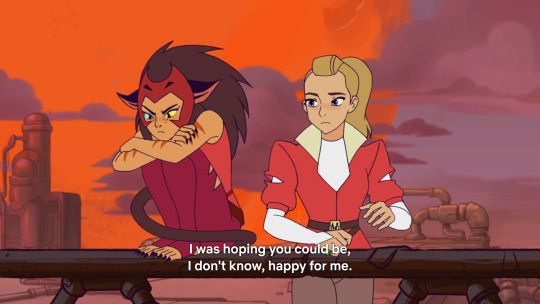
In return, society obligates the Weak to care for, support, and - not to put too fine a point on it - coddle the Strong. Because Strength demands stoicism, the suppression of emotion in service to 'The Greater Good', it pushes the job of care and emotional labour onto the Weak. It is the duty of the Weak to watch from the sidelines, ready to rush in at half-time with towels and treats, to devote themselves to cheering and comforting, ensuring that the Strong remain strong (and place their own feelings and needs on the shelf to do so).
It is transactional, a tit-for-tat bargain, duty and debt and obligation. But it's not a transaction between the Strong and the Weak - it is a bargain between both groups and society as a whole. It is society - the Horde and it's war - that demands the labour of the Strong in return for the love and care of the Weak, that promises the Weak safety and security in exchange for the care they provide.

The binary of Strength and Weakness is a social construct and a social contract. And it is not optional.
Enforcement
The power structure of the Horde is deeply invested in the creation and maintenance of this binary - it is what allows it to function [in a manner of speaking]; it creates good little soldiers, and the support structures needed to keep those soldiers compliant and functional [for long enough to be useful]. And it self-corrects when individual cogs waver in their role.
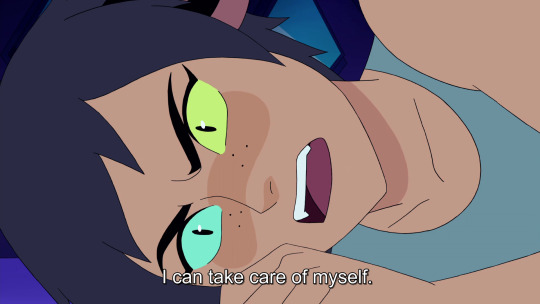
If the Weak are not weak - if they win, if they are no longer afraid - then there is nothing to compel their participation, no reason for them to continue providing emotional labour for the Strong. Except, of course, that they are denying the Strong the care that society has said is their due.

Violence is the tool of the Strong, and Strength is found in wielding it to claim what is rightfully theirs. If the Weak are not sufficiently afraid of external threats, there is always an internal threat, waiting in the wings.
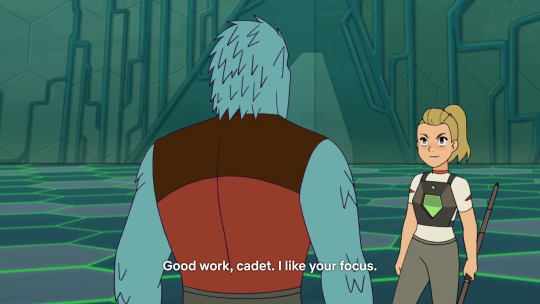
And the Strong? Strength is about continuous, unstoppable winning; failure is unthinkable. If the Strong can fail, then it means they aren't the only ones who can do this, they they are unable to provide the flawless performance and protection that justifies their place in the system - the very existence of 'Strong' as a category.

So, when failure does occur (and it inevitably will), thumbs are put on scales. Struggles are left unseen, mistakes ignored. Coincidences are treated as the product of skill and planning. Mediocre results are framed as the greatest of victories, winning redefined so as to reinforce the status quo. Losing isn't punished. It's erased.
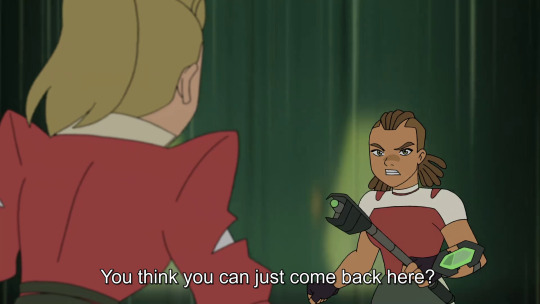
Which is not to say that the Strong are untouchable. If they question their role - if they balk at the labour demanded of them, if they call out hypocrisy, if they try to leave - the system will revoke their Strength. It will take the thumb off the scale, remember every fault and failing, strip them of every prize and possession. The threat that hovers over the Strong is not that they will be made Weak - it's that they will be made nothing at all.
Because the system doesn't care if people fail to live up to the impossible standards it creates; what it cares about is that those standards continue to be perceived as legitimate and attainable. What it punishes is rejection of the system.
Conclusion
So that's what Strength is, in the Etherian Horde.
It's hanging your entire identity on being a protector, it's measuring your worth by how much you win, it's bottling all your feelings up forever, it's making "just punch him" the only acceptable answer to conflict.
It's demanding that "the Weak" lessen themselves, fold themselves up, and let you control them to justify your privileged place in society. It is insisting that you are owed endless emotional labour, that it is just and right and good that society makes these demands on your behalf.
It is the impulse to use violence whenever any of the above is challenged, the belief that your anger isn't a feeling you're having (it isn't a feeling at all), but a moral imperative that you are compelled to act on.
It is a constant nattering fear that if you don't, that if you stop to question any of this, then the world will realize that you aren't Strong, that you're a fake, a poseur, worthless. That you must comply, because without Strength, you are nothing.
In short, it's fucking toxic masculinity.
229 notes
·
View notes
Text
If high-income countries are to decarbonize fast enough to stay within their fair-share of Paris-compliant carbon budgets, then urgent climate mitigation tasks – like building renewable energy capacity, insulating buildings, expanding public transit, innovating and distributing more efficient technologies, regenerating land, etc – need to happen very quickly. This “green production” requires mobilizing massive amounts of labour, factories, materials, engineering talent, and so on. In a growth-oriented scenario, this is difficult to do because our productive capacities are already devoted to other activities (activities that are organized around profit and which may not contribute to social and ecological objectives). So we need to either compete with existing forms of production (for labour, materials, energy etc, which can drive prices up), or otherwise increase total productive capacity (i.e., grow the economy). This cannot be done at just any desired speed. Under these conditions, there are very real physical limits to how fast we can decarbonize.
Scaling down less-necessary production solves this problem, not only because of the two benefits indicated above, but also because it liberates productive capacities (factories, labour, materials) which can then be remobilized to do the production and innovation required for rapid decarbonization. For example, factories that are presently devoted to producing SUVs can produce solar panels instead. Engineers that are presently developing private jets can work on innovating more efficient trains and wind turbines instead. Labour that is presently employed by fast fashion firms can be liberated to train and contribute to installing renewable capacity, insulating buildings, or a wide range of other necessary objectives depending on their interests, through a public job guarantee program linked to green public works.
This helps us rethink a longstanding question in ecological economics. Some ecomodernists have in the past argued that it is easier to achieve green transition in a bigger economy than in a smaller economy, because it means we have more capacity to devote to green production. But this fails to grasp the nature of the problem. Yes, a bigger economy may have more capacity, but in a growth-oriented scenario that capacity is already allocated. In this respect bigger economies face the same problem as smaller economies. But a degrowth scenario is not a “smaller economy” (i.e., a low-capacity economy). It is a high-capacity economy which is reducing less-necessary production, and therefore is suddenly endowed with spare capacity that can be redirected for necessary purposes. This is a unique situation that carries significant potential: it enables acceleration in the speed of green production and innovation at a rate faster than what can be achieved in a growth-oriented scenario.
45 notes
·
View notes
Text
Would you rather call it cottagecore or self-sufficiency? A short essay on rural life and self-reliance.

Good afternoon!
I originally intended to write about cottagecore, which is pretty much what surrounds me in this rural region. However, I have a love-hate relationship toward these social media aesthetics, which are first and foremost photography aesthetics and themes with ugly names. This said, in a context of domestic abuse, I mostly count on myself for many of my needs. It is true that self-sufficiency and food self-relience tend toward the Cottagecore sub-culture, and it is tempting to go in that direction, but it would be first and foremost lying to myself, and then to others. Therefore, I prefer to face my own reality by talking about my life journey, rather than to sweeten my speech.
I prefer to be clear, in a situation of abuse, when somebody else is controlling the budget and poverty is a reality, complete financial and material autonomy is more than a fantasy, it's a need.
Facing reality: you don't need to aim for complete self-sufficiency
In fact, to be honest, you'll never make your own medications. What is complete self-sufficiency? A myth.
This said, my aim is to improve my self-reliance, which relies on a few hobbies, such as gardening, and I invite you to do the same.
Although my production of food is far from being all-year-round, or even enough for canning and preserving, my first attempt has provided me with fresh fruits and vegetables almost every day of Summer. In terms of fruits, I have only grown strawberries and raspberries, as well as the old apple tree planted decades ago by the late owners. I have grown a wider array of vegetables, such as tomatoes, peas, snow peas, and yellow and green beans. A little bit of my protein intake came from lima and borlotti beans, and I had five fresh herbs to choose from. My biggest failures have been my onions, garlic bulbs and radishes; they were disappointingly lost to rot and drought before harvest.
Overall, this was not bigger than a balcony garden, which proves that you don't need a lot of space to feed yourself if you aim for a percentage of your plate, rather than the usual message of the internet, which is complete self-sufficiency.
Growing food can be the cure to food trauma and insecurity
If, like me, you've been traumatized by food shortages and a lack of financial freedom, growing your own food can be the necessary cure, and at relatively small costs.
At the very least, you'll control some of the food you'll have later in the season. If you're lucky, you can make preserves, or meal-prep and freeze.
Baking and bread-making
This is something I was already doing, and there is something special about having a dessert or a slice of fresh bread, still warm from the oven.
All winter long, I try to do something inspired by the Swedish fika concept, and use these months to plan ahead for Spring.
Needle arts are far from dead
From cosplay to insta-worthy embroidery, the needle arts are far from dead, despise their temporary rejection at home, as shopping malls and hypermarkets became my own parents' stress-relief and boredom-killing hobby. From a personal point-of-view, their consumption habits were far from my values, and I have come back to sewing and knitting to supply a percentage of my wardrobe. I've also tried to make very simple jewelry.
The initial cost is not always cheaper to make your own, because you will possibly choose a thicker, high-quality fabric, that will hopefully last longer, which is where you can really save.
I often like to remind myself that this is not child labour, but my own labour; and it makes a world of a difference from a moral standpoint.
♫ These boots were made for walking, and that's just what they'll do ♬
When I have decided to get back in shape, I didn't have the financial means to pay a subscription at the gym. However, did you notice the free sports you can start doing today?
I have started walking almost every sunny day, and it has greatly improved my cardio-vascular health, as I was enjoying the scenery and leaving my problems at home, behind a closed door.
When bad weather forces you to stay inside, there are still many Youtube channels to watch, and I have even found a few workout television shows on major channels. They tend to be at 6am, though, and they have to be recorded to watch them as a hobby, instead of a morning chore.
Which comes to a conclusion: dis I really ever intend to write about the Cottagecore movement and its photography aesthetic, or simply about real life and self-care? I'd say the latter, for this is what feels better, and always will.
#lifestyle#self-sufficiency#food self-sufficiency#clothing self-sufficiency#cottagecore#cottagecore aesthetic#garden#gardening#baking#homemade baking#needle art#sewing#knitting#self-reliance#jennifersblog
41 notes
·
View notes
Note
i'm not great at watching TV so i never knew what to expect from a new succession episode (and tbh i think most tv critics are also bad at guessing what will happen on this show) but after finding your blog it's amazing how predictable things are because you Get It. like i guess i'm not predicting per se but when ken started talking about denying the body's failure and living forever i was like "oh yeah just like tumblr user romanroydinnerparty was saying"
honestly i wish i was some kind of predictions genius lmao but yeah i thought the whole living+ thing was very well executed. i mean it's sort of the perfect look into this brand of techno-capitalist fantasy: the world is dangerous, but we'll keep you safe, healthy, and constantly stimulated. in some ways the entire show has been an exploration of how aging and dying are configured as moral weakness under capitalism, and so here's kendall's proposal for mitigating that danger: a technological deus ex machina. it's intolerable for this type of worldview to suggest that bodily weakness may be inevitable and internal; it always has to be an external danger or a moral failure that sufferers have brought upon themselves. if you can't generate value and show that with your body then you're already socially dead. like it's very deliberate and necessary, the way that living+ offers health and fitness as part of its package—essentially the proposal is to create the perfect gilded cage to preserve and produce an endless supply of labourers who will be coddled into compliance and kept healthy enough to grease the wheels of america's economic machine forever.
101 notes
·
View notes
Note
this is a question that on other blogs would likely get me exploded with hammers but you seem nice and i swear im just genuinely just trying to understand, but do you have any thoughts on why marxist-leninists are so dismissive of anarchists?
first of all i'd like to preface that i think that marxist-leninists being dismissive of anarchists (and conversely anarchists hollering about evil tankies) is something that is much more common among Posters Online than among people of either political persuasion who are actually meaningfully involved in communist organization -- if 'anarchist' or 'Marxist-Leninist' is primarily an online identity to you, then you're likely to want to signal that identity by loudly and pointlessly disdaining a designated out-group -- if anarchist or marxist-leninst praxis is something you actually do, you will quickly realize, however much you disagree or even dislike the other tendency, that for most practical purposes you will be much served working together when it comes to any anticapitalist or antifascist action.
secondly i'd also like to add that i, personally, am much more tolerant of anarchists than most marxist-leninists even by the standards of actual organizing. i have mutuals, friends, and comrades who are anarchists -- while i believe that the differences between marxism-leninism and anarchism are irreconcilable in a revolutionary situation, i believe that in the vast majority of the world the situation is so far from revolutionary that there is no material or practical conflicts between marxist-leninists and what lenin called "the best of the anarchists". many anarchists have made incisive and useful critiques of capitalism and even of socialist projects (even though i think those critiques are weakened by the anarchist inability to provide a viable alternative).
all that out of the way, here are some problems that i (and other marxist-leninists) have with anarchists:
#1: class-blind & idealistic theoretical frameworks. a lot of anarchists tend to view political systems and articulate criticisms in terms of extremely abstract ideas about 'power', 'authority', and 'hierarchy'. this flattens a lot of substantially different class relationships into broad and inexact categories such as 'domination' -- the result of this is that anarchists lose sight of class relations and the material basis from which power emerges and is maintained. often they will psychologize these elements, explaining systems and the way they function by projecting a psychoanalytical framework onto the holders of power. i find these analyses usually produce incoherent and politically useless truisms. being based purely on ideals and not on materialism leads a lot of these anarchist suppositions to tie themselves into knots -- as engels said, "a revolution is the most authoritarian thing there is", yet many anarchists are revolutionary (supporting the violent seizure of power from the bourgeoisie) but viciously opposed to the DoTP (the violent maintenance of power over the bourgeoisie), with the imo totally incoherent rationale that the latter is 'authoritarian' while the former is not.
#2: individualism. anarchists are generally very concerned with 'individual freedoms' and the importance of the individual as a political unit -- as i often say on this blog, i deny the individual as a meaningful political unit. to me 'liberation' means the working class as a whole being able to live comfortably without the threat of death hanging over their heads if they fail to sell their labour -- 'freedom' is only meaningfully possible when there is a liberation of the working class in totality. in its worst manifestation, this leads a lot of anarchists to totally reject the concept of socially necessary labour or the need for labour to be organised at all (cf. this meme)
#3: the cult of spontaneity. anarchists (obviously) do not believe in centralised organisations. i think, frankly, this is silly, because centralised organisations are the only body capable of mobilizing the working class to mass action. without centralisation, it's impossible to coordinate and act in unison -- that is, to do the very things that make any revolutionary action feasible at all. the revolutionary strategy of simply waiting for the people to 'spontaneously' rise up and install communism because they have all separately decided to is one that's, quite simply, fantastical and has no basis in reality. this holds true for action that falls short of 'armed revolution' too -- to be effective and replicable, direct action needs to be planned, deliberate, and coordinated, and this just isn't possible without an organizing body.
#4: repeating imperialist talking points. now this is not true of all anarchists -- there are lots of principled anti-imperialist anarchists in the world. however, there are also a lot of anarchists who will engage in borderline apologia for US imperialism, who will parrot lines about 'dictators' and 'totalitarian regimes', who refuse to oppose US imperialism because 'all states are the same'. this ultimately (in the most charitable interpretation) stems from #1, where the choice of whether or not to oppose US imperialism is seen mostly as a personal idealistic moral choice (decide What Is Good and What Is Bad) rather than a material choice about what political action can be taken. and of course there are many valuable critiques to be made of the USSR's many failures, and some of these critiques have been made by anarchists -- but some anarchists will descend to Black Book of Communism levels in an attempt to get one in on a strawman of 'Stalinism'
if you want a more detailed in-depth criticism of anarchism from a marxist-leninist perspective that i mostly agree with, this medium article is fantastic. but these four reasons are the main ones i -- while not dismissive of anarchists -- am not an anarchist and generally disagree with anarchist theory.
201 notes
·
View notes
Note
are you familiar with XingXing the one armed temple macaque?
I am, and to be honest I have very mixed feelings about her situation.
I have been vocal about how it is wrong and unethical to keep primates as pets, how feeding wildlife is harmful, and how human/primate interactions are dangerous for both parties. XingXing is an interesting case, as she does not fit perfectly into the categories I have talked about.
XingXing is not a pet, and is able to free roam. I have been told that XingXing decides how to spend her time and will often go into the forest for days at a time. She is fed by people, but only a few who are trusted to do so, who she has ongoing relationships with. Additionally, she has a trauma history that means that she would struggle in the wild if left entirely alone.
In complex cases like this it is easy to say that she should live at a sanctuary. Of course animals living in the wild is ideal, but most people agree that if that is not possible that a sanctuary or zoo should care for them. The reality is more challenging, as sanctuaries are in high demand and need a lot of support. They are typically underfunded and rely on the labour of volunteers, and while they would love to care for every animal in need it is simply not possible. Additionally, major changes can be detrimental for animals especially if they have trauma histories. As such I feel that if XingXing is able to live well where she is, her comfort should be prioritized.
That being said, I feel that there should be some improvements made to her lifestyle and the way it is documented. While being fed may be necessary if she is unable to forage for herself, she appears to be quite overweight. While humans can be a pretty wide range of sizes and still healthy, other species have much narrower ranges of healthy sizes and XingXing's size may be detrimental to her health and activity level. The woman who cares for her is elderly and may not be able to encourage her to be more active, but despite XingXing's diet appearing to be not bad health wise (mostly fruit from what I have seen) I think cutting down on the sweets and adding more leafy greens could be good for her both in helping her lose weight and encouraging her to forage for her own food as much as possible.
The only major issue I have with XingXing is her social media presence. She is very cute and charismatic, but seeing her being fed and pet by people can be detrimental to her species and other monkeys in the long term. People who see monkeys being treated like pets even if they are not pets are likely to get the idea that monkeys are safe, friendly, and even adoptable. A caretaker for a macaque that requires supplemental snacks giving her a banana and a tourist giving a wild macaque a banana to bribe it to pose for a picture can look virtually identical on social media. Increasingly, social media accounts for accredited sanctuaries are adding disclaimers or even not posting photos or videos that show staff touching the animals altogether to avoid making it look like the animals could be pets.
XingXing is lovely and I hope that she is well taken care of and active, but I also worry that people who see photos and videos of her will get the wrong idea on appropriate human/primate interactions.
23 notes
·
View notes